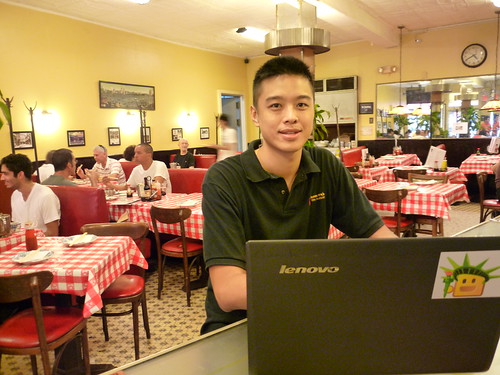Many first generation Chinese restaurant owners believe that the only key to success is through hard work. Through the decades, new restaurant businesses were started and nurtured by that mindset. As long as you work hard and provide quality food, customers will come and your business will grow by word of mouth.
The rules of the game began to change shortly after 9/11.
“Since September 11, the restaurant owners in Chinatown began to see their businesses shrinking,” said Andy Yu, the executive director of the Greater Chinatown Community Association. “Things become even worse when the economy began to deteriorate. Hard work no longer guarantees good business.”
Wilson Tang, the second generation owner of Nom Wah Tea Parlor, one of the first restaurants opened in Chinatown, has his own business philosophy that differentiates himself from the rest of Chinatown.

Wilson Tang said his having a lot of fun blending social media use into running this legacy Chinese restaurant.
When the restaurant was passed to Tang in January from his uncle Wally Tang, a first-generation Chinese immigrant who worked at Nom Wah for more than 60 years, the young Mr. Tang not only renovated the aged kitchen, but also revamped the marketing tactic of the business. The use of social media became key.
“I am always on Facebook; I am constantly tweeting,” said Tang, who uses the sites extensively to promote the restaurant and build connections with customers. “Social media is a great help. It opens the window of opportunity for me as far as getting the word out of the reopening of this Chinatown establishment.”
Faced with a decade of economic trouble brought on by 9/11, some younger entrepreneurs in Chinatown are now embracing social media to help turn things around. Although social media has become a marketing staple in the restaurant industry at large, it still hasn’t caught on in many of the traditional kitchens of Chinatown. Thus this second generation of entrepreneurs is often left struggling to balance business obligations with tradition.
Tang admits his uncle simply cannot understand his efforts to market the business over the Internet. “They think it is a waste of time, my chef thinks I would be better off helping out in the kitchen,” he said. “It has passed their age bracket to understand that.”
The older Tang’s uncertainty on this new approach is not uncommon in the circle of Chinese restaurant owners. “Most Chinese restaurant owners in Chinatown, at this point, are still first generation immigrants,” said the Community Association’s Yu. “Internet and social media are both very novel things that these new immigrants are either unwilling to try or unable to understand.”
Even though it is the trend to use the Internet to market your business, for most Chinese restaurants in Chinatown, however, it is a process that could take many years. The younger Tang adds: “It’s a mindset for our ethnicity that is going to take time to break.”
Just two blocks away from Nom Wah, the Amazing 66 restaurant opened 5 years ago is without doubt a newcomer in the Chinatown restaurant business. The manager of the restaurant Mr. Li, a first generation Chinese, admitted that up till today they keep using very traditional marketing tools. “We mainly do advertising and promotion on Chinese newspapers inNew York,” Mr. Li said. “We don’t have a Facebook page. We just feel that the majority of our customer base doesn’t really use that.”
Mr. Li might be surprised if he learnt that his restaurant receives dozens of reviews, both positively and negatively on Yelp.com all the time. It seems that social media has infiltrated into the business regardless of the owner’s wiliness to be part of it. According to Yu, there are more than 100 Chinese restaurants in Chinatown. A quick search on Google, however, shows that only 10 have a Facebook page and most of the pages are barely updated.
Although the first generation may be reluctant to embrace social media, what may be contributing more to Chinatown’s slow dial up is that there is very few second generation Chinese who is willing to work in a restaurant.
“For many first generations, their American dream is their kids to go to a good school; get a good job and don’t have to come back and do this restaurant business,” said Wilson Tang. Among his friends, he may be the only one who came back to run the family business. “For me it is not only about hard work, it is also about having fun.”
For Tang, part of that fun is expanding his family’s business. His next step is to open a new restaurant. He’s already got enough resources and kitchen capacity to do that, he says, he’s just waiting to find the right person to manage the new store.
Maybe pretty soon, Tang would be able to find a new manager on LinkedIn.
